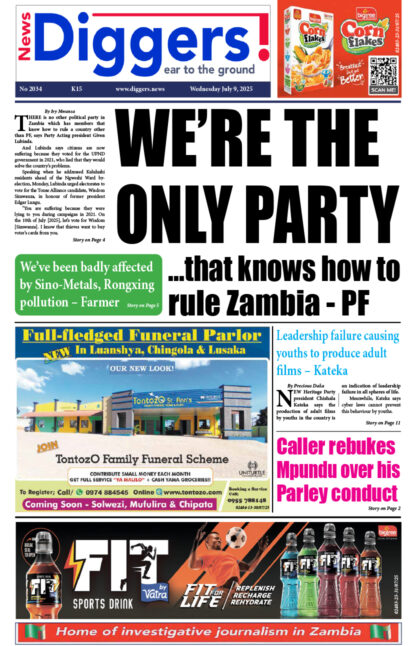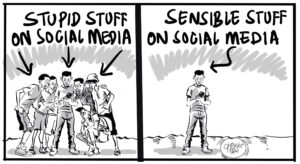On, 16th August 2024, the Ministry of Energy announced that beginning 1st September, load rationing would be increased to a record 17 hours. This is from the current 12 hours. The decision is bound to be met with outcry from the Zambian public. I myself must admit a level of disappointment in the manner in which the energy sector has been handled under the UPND regime. Government is quick to attribute most responsibility to the drought. You can understand this. However, Government and public leaders are elected to deal with crises of whatever nature. Climate change is not new and this is not the last El-Nino weather phenomenon we will have. If we are not careful we will find ourselves in the same situation in years to come.
I question decisions which have been made such as the $750 million investment in the Kafue Gorge Lower Power Station. This was commenced by the Patriotic Front regime and completed by President Hichilema’s Government. Why are we still investing in hydro-electric dams, in the very region most prone to dry spells in our country? It is only after this drought that such investments are being targeted to the North of the country. Today the Kafue Gorge Lower Power station is running at bare capacity. The North meanwhile, which is laden with water, has no hydro-power station. Two are now being constructed which are the Kalungwishi and Mutinondo power stations. Such investments, however, are not completed in short periods of time. It will be at least 4 years before they come online. These investments are therefore too little, too late.
On the increase in hours, this is bound to cripple the Zambian economy and society at large. I advise the President and his advisors to take this matter very seriously. Zambians are not easy to satisfy and are easily frustrated by mismanagement in whatever form and whichever sector it arises. As the UPND Government clocks three years in Government, leadership must see to it that the progress that it has made elsewhere is not jeopardized by failings in the energy sector. We have seen in South Africa, the ability of a power crisis to seriously weaken an incumbent’s popularity. It is not enough to blame the drought. I believe Zambian are tired of hearing this. What that is is a mere avoidance of responsibility. Shocks occur in every nation. Model Governments anticipate shocks and they plan to mitigate their impact.
I will now turn my attention to recommendations for leadership and the people, the first of which will be the implementation of cost reflective energy tariffs. Zambia has one of the cheapest electricity tariffs in Africa. This is actually one of the reasons why we have a dominance of hydro-electricity in our generation capacity. Hydro is more appropriate for cheap electricity. Solar on the other hand is expensive. This is why we have invested very little in solar power generation. This is also why private investors have not ventured into the sector. The tariffs at which ZESCO would purchase their power is simply not enough for them to pay their financiers. Most of such projects are funded through debt and equity. This is more of a call to the public than Government. The plea is let us be a bit more accommodating of cost reflective energy prices. Cheap is expensive. There are parallels with the fuel sector. When fuel was cheap, shortages of the commodity were quite common. Yes, fuel might be expensive now, but at least we have it at all times. The same can be true for electricity. In my personal opinion, I’d rather have expensive energy and be assured I have it, than have it cheap and have serious difficulties in accessing it.
I also recommend that ZESCO seriously expedite operationalization of the net metering and open access policies. Net metering commenced on 1st August. However, I believe, no one is selling power to ZESCO because ERB is yet to determine the tariff at which ZESCO will buy power. The bureaucracy here is very frustrating. Why are we delaying things that are pretty straightforward? I have read the net metering regulations which were developed in 2019 and it is quite clear how the tariff should be arrived at. Net metering presents a very viable solution to this crisis. Government, however, is seemingly accustomed to moving at a snail’s pace, depriving the people of the benefits of whichever remedial measure. On open access, I am not aware of any private entity that has begun using ZESCO’s grid network. Again Government needs to be more aggressive here.
I also recommend that ZESCO begins supplying solar panel equipment, inverters and batteries. Despite the tax incentives introduced by Government, the cost of these products continues to be out of reach for most Zambians. Prices have not moderated. Given the urgency of the matter, the interests of suppliers cannot be placed above the needs of consumers. This measure in conjunction with implementation of net metering will substantially ease power pressures both for the grid and for consumers.
As I conclude, I will repeat, this energy crisis could have been avoided. Hear me correctly, the drought could not have been avoided, but its effect on energy could have been so. Since 2015, load shedding has been a recurring occurrence for our society. It is nearly 10 years since 2015. How much more time do we need to deal with load shedding once and for all? The implications of our inaction will be dire as the social impact of energy inadequacy will stretch across the entire spectrum of our people. Despite this, Government still has time to put things right. It’s darkest before dawn, as the saying goes. Hopefully, the discomfort brought on by this latest round of load shedding will teach us a lesson. A solution must be found. Zambians will accept nothing less.
The Author is an Economist and member of the Economics Association of Zambia



















